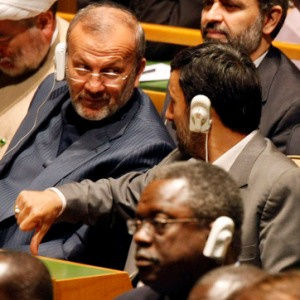The Fruits of Mottaki’s Shuttle Diplomacy

On June 9, 2010, the United Nations Security Council adopted Resolution 1929 by a majority of twelve votes in favor, two against (from Turkey and Brazil), and an abstention by Iran’s strategic ally, Lebanon.
The five permanent members of the Council (the United States, France, Britain, Russia and China) had expressed their support for the resolution in advance. The other seven members who voted in favor of the resolution, namely the African countries of Nigeria, Gabon and Uganda (all members of the Non-Aligned Movement), Japan, Austria, Mexico and Bosnia-Herzegovina, ignored Iran’s requests to either be against the resolution or abstain from voting, preferring to side with the global powers.
The first reaction to the resolution came from President Ahmadinejad. During his visit to Tajikistan, in response to a question about the resolution, he said, “these resolutions are petty for the Iranian nation. I send a message for one of them (leader of an unidentified power) that the resolutions you pass are like a used tissue that must be thrown into the bin afterwards”. Ahmadinejad made similar comments during his visit to China.
Undoubtedly, the Iranian diplomatic apparatus went to great lengths to avert another sanctions resolution. Foreign Minister Manouchehr Mottaki’s trips to most permanent and non-permanent UNSC member countries are the best proof of Iran’s eforts. To advance Iran’s diplomatic agenda, he even dared invite the U.S. Ambassador to the United Nations, Susan Rice, to a dinner ceremony at the Iranian UN Ambassador’s residence. Rice, nonetheless, like some other Western senior diplomats, chose to send a lower-ranking diplomat to the extraordinary dinner. (Translation: the invitation was rejected.) And the Japanese Ambassador merely referred to the “frank exchange of ideas” during the dinner.
Iranian state-run media tried their best to put a shine on Mottaki’s visits, even in cases such as his trips to Gabon and Uganda. While it was always clear that these countries neither want to nor can vote against the will of global powers, reports tried to imply that these countries would ultimately side with Iran. Uganda, Gabon, and Nigeria were the three countries that Ahmadinejad later claimed were under “unrelenting pressure” to vote in favor of the sanctions.
Mottaki’s visit to Bosnia-Herzegovina also became controversial. Even before the Iranian foreign minister’s visit, the Presidency of the Bosnia-Herzegovina released a statement voicing its support for the likely sanctions resolution of the UNSC against Iran. The same words were repeated by Haris Silajdžić, Chairman of the Presidency. Mottaki’s response to the Bosnian diplomat failed to heal the wounded dignity of Iranians. Clearly, such behavior from the Bosnians would not have been tolerated in the time of Kamal Kharrazi –Khatami’s foreign minister- or even Ali Akbar Velayati, Iran’s foreign minister from 1981 to 1997.
Even Japan was not ignored by Mottaki, although he was aware of Tokyo’s unalterable stance on the sanctions. Ironically, Ahmadinejad scoffed at Japan after the adoption of the resolution: “how could a country hosting U.S. military bases vote independently?” he questioned. “Definitely, it can’t vote in independence.”
Parallel to Mottaki, Ahmadinejad exploited full diplomatic potentials to influence the course of events leading to decisions on new sanctions. During his most recent visit to New York (to attend the UN NPT Review Conference), in an interview with the Boston Globe, the Iranian president tried to tie a new resolution to Iran-U.S. relations: “Any connections and contacts with Iran, the pathway to Iran, will be shut permanently," he said, if tougher sanctions were passed. "Those who are trying to radicalize the atmosphere here fail to understand that they are speedily moving towards the cliff.”. And Ahmadinejad’s diatribe against the Russians and his demand from Moscow that it shows transparency received a tough response from Kremlin.
In order to advance nuclear negotiations, Ahmadinejad did his level best to convince Turkish Prime Minister Erdogan to attend the G15 conference in Tehran. Erdogan, however, agreed to travel to Tehran only after he was assured of Turkey’s central role in the nuclear swap deal. The outcome was Tehran Declaration, a positive but overdue step.
Even a country like Uganda –that plays a marginal role in Iran’s foreign policy- attracted the attention of Iranian statesmen. It would be perhaps the last time Uganda could boast of hosting three Iranian senior officials in a row, namely the president, the foreign minister and speaker of the parliament. And as usual, Iran did not forget to offer Russia and China economic sweeteners to help get rid of the ‘used tissue’.
Despite all this, it seems the high price Iranians have paid has returned no benefits. The resolution was ratified and our diplomats will return to the negotiating table while the key members of the Security Council -which according to Ahmadinejad “is a tool in the hands of the United States, not the world’s nations, and has a dictatorial structure”- hold the upper hand.
Nevertheless, contrary to what the president claims, the resolution will not block the way toward negotiations with the United States. Those assigned by the government to negotiate with the U.S. will definitely not abort their mission.
A survey by independent institutions might show what a heavy price the Iranian nation has paid for the sinuous stances of the government and its radical rhetoric that merely serves domestic purposes. After all the dust-ups die down, the question which will emerge will be, who is responsible for the administration’s withdrawal from Dignity, Wisdom and Expediency—the pillars of our foreign policy set by the Supreme Leader? Who is going to compensate for the harmed dignity of a nation due to the arbitrary behavior of the government?

